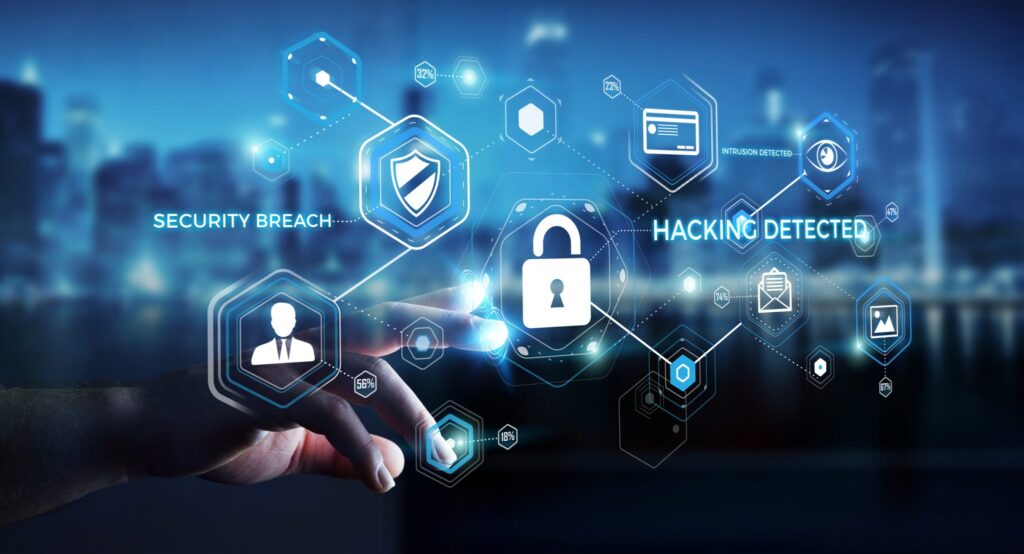The Role of Blockchain in Identity Management: Enhancing Security and Privacy

Table of Contents
In an increasingly digital and interconnected world, the management of identity has emerged as a paramount concern, both for individuals and organizations. The proliferation of online services, data breaches, and privacy concerns has underscored the urgent need for innovative solutions that can fortify security and safeguard personal information. This is where blockchain technology steps into the spotlight, offering a transformative approach to identity management. This article delves into the pivotal role of blockchain in reshaping the landscape of identity management, focusing on its ability to enhance security and privacy to unprecedented levels.
Unveiling the Future: How Blockchain Revolutionizes Identity Management for Unbeatable Security and Privacy
In an increasingly interconnected and digital world, the need for robust identity management solutions has never been more crucial. The rise of cyberattacks, data breaches, and identity theft has highlighted the vulnerabilities of traditional systems. However, amidst these challenges, blockchain technology emerges as a beacon of hope, promising unprecedented security and privacy in identity management.
Blockchain, the distributed and immutable ledger technology that underpins cryptocurrencies like Bitcoin, offers a revolutionary approach to identity management. Unlike traditional centralized systems, where sensitive information is stored on a single server, blockchain’s decentralized nature distributes data across a network of nodes. This fundamental shift in architecture eliminates a single point of failure, making it significantly harder for malicious actors to compromise sensitive data.
At the heart of blockchain’s impact on identity management is its cryptographic security. Each identity record is encrypted and linked to the previous one, forming an unbreakable chain of transactions. This cryptographic linkage ensures that any attempt to alter or tamper with data would require altering the entire chain, a near-impossible feat. This creates an unprecedented level of security, as even the minutest change would be instantly detectable.
Furthermore, blockchain enables self-sovereign identity, putting individuals in control of their own data. Users can selectively disclose information to third parties without granting access to their entire identity profile. This granular control enhances privacy while reducing the risk of data breaches. Additionally, it eliminates the need for intermediaries that often store and monetize user data without their explicit consent.
As blockchain technology matures, its integration into identity management systems holds immense potential. From border control and immigration to financial services and healthcare, blockchain’s impact on security and privacy is transformative. Governments and corporations are beginning to recognize its potential, leading to pilot programs and collaborations to explore its implementation.
While the promise of blockchain in identity management is undeniable, challenges remain. Scalability, interoperability, and regulatory considerations are hurdles that must be addressed for widespread adoption. Nevertheless, the path forward is clear: blockchain stands as a cornerstone of the future of identity management, offering unbeatable security and privacy for individuals and organizations alike.

Guardians of Digital Identity: Harnessing Blockchain’s Power to Safeguard Security and Privacy
In the digital age, personal identity is no longer confined to physical documents; it extends into the vast realm of cyberspace. As individuals traverse this new landscape, protecting their digital identity becomes paramount. Enter blockchain technology – a potent force that has emerged as the guardian of security and privacy in the digital realm.
At its core, blockchain is a decentralized ledger that enables the creation of secure and tamper-proof digital records. This inherent security stems from its cryptographic mechanisms, which ensure that once a piece of information is added to the blockchain, it becomes virtually impossible to alter or delete without consensus from the entire network. This makes blockchain a natural fit for identity management, where the integrity of data is paramount.
Blockchain’s impact on identity security is profound. Traditional databases are susceptible to breaches, hacking, and unauthorized access due to their centralized nature. In contrast, blockchain’s decentralized architecture scatters data across a network of nodes, rendering it impervious to single points of failure. Attempts to breach the system require simultaneous compromise of a majority of nodes, making such attacks highly improbable.
Privacy is another crucial aspect that blockchain bolsters. With self-sovereign identity enabled by blockchain, individuals can maintain control over their personal data. They can selectively share specific pieces of information without revealing their entire identity. This concept revolutionizes consent and empowers individuals to engage with online services while maintaining their privacy.
Industries across the board are harnessing blockchain’s power to safeguard identity. Financial institutions are exploring blockchain-based Know Your Customer (KYC) processes, streamlining customer onboarding while enhancing security. Healthcare providers are leveraging blockchain for secure patient data sharing, improving interoperability while ensuring patient confidentiality. Governments are even experimenting with blockchain-based digital IDs to combat identity fraud and enhance citizen services.
Yet, challenges persist. As blockchain technology matures, scalability and energy efficiency remain focal points for development. Interoperability between various blockchain platforms and regulatory frameworks also demands attention. Overcoming these obstacles is essential for blockchain’s full potential to be realized in safeguarding digital identity.
As guardians of digital identity, blockchain’s promise lies in its ability to offer an unassailable layer of security and privacy, redefining the way individuals interact with the digital world. The journey towards a safer, more private digital landscape is well underway, and blockchain stands at the forefront of this transformative evolution.
Also read: Exploring the Potential of Aether: Decentralized Finance and Beyond
Beyond Borders: Exploring the Transformative Influence of Blockchain on Identity Security and Privacy
In an era of unparalleled technological advancement, the way we perceive and manage identity is undergoing a seismic shift. At the heart of this transformation is blockchain, a groundbreaking technology that transcends geographical boundaries, revolutionizing identity security and privacy on a global scale.
Blockchain’s influence extends beyond its origins in cryptocurrencies. Its decentralized and incorruptible nature has paved the way for a new era of identity management. Traditional systems, often confined by borders and jurisdictions, struggle to keep pace with the digital realities of the 21st century. Blockchain, however, offers a borderless solution that transcends physical confines and offers a secure haven for personal information.
The core principle of blockchain lies in its ability to create an indelible digital record. Each piece of data is cryptographically linked to the previous one, forming an unbroken chain of information. This unalterable ledger ensures that identity records remain tamper-proof and resistant to unauthorized manipulation. As a result, individuals gain greater control over their personal information, a transformative departure from the conventional norms of centralized data repositories.
The borderless nature of blockchain opens new horizons for identity security. Consider international travel and immigration, where identity verification is a complex and time-consuming process. Blockchain streamlines this procedure, enabling authorities to verify identities swiftly and securely, all while safeguarding sensitive information. This not only enhances security at border crossings but also expedites the movement of people across the globe.
Furthermore, blockchain has the potential to catalyze financial inclusion for millions. In regions with limited access to traditional banking systems, blockchain can facilitate the creation of secure and verifiable digital identities. This, in turn, enables previously underserved populations to access financial services and participate in the global economy.
Yet, as with any transformative technology, challenges persist. Technical scalability, regulatory alignment, and public adoption are areas that require careful consideration. Collaborative efforts between governments, industries, and blockchain innovators are essential to surmount these hurdles and fully unlock the technology’s potential.
Empowering Individuals: A Deep Dive into Blockchain’s Role in Amplifying Identity Management Security and Privacy
In an increasingly digitized world, the security and privacy of personal identity information have become paramount concerns. Enter blockchain technology, a revolutionary innovation with the potential to transform the landscape of identity management. This article delves deep into the intricate interplay between blockchain and identity security, highlighting how blockchain’s decentralized and immutable nature empowers individuals to take control of their personal data.
Blockchain’s Core Tenets and Identity Security:
Blockchain operates on a foundation of decentralization, transparency, and immutability. These fundamental principles address many of the vulnerabilities present in traditional identity management systems. Unlike centralized databases, where a single breach could compromise millions of records, blockchain’s distributed ledger ensures that data is stored across a network of nodes, reducing the risk of a single point of failure. Furthermore, the immutability of blockchain records makes it extremely difficult for unauthorized parties to tamper with or alter sensitive identity information.
Self-Sovereign Identity (SSI):
One of the groundbreaking concepts enabled by blockchain is Self-Sovereign Identity (SSI). SSI allows individuals to have full control over their identity information, choosing when and with whom to share it. Using cryptographic techniques, individuals can generate verifiable credentials that attest to their identity without revealing unnecessary details. This empowers users to participate in digital transactions and interactions without divulging more information than necessary, thus minimizing the risk of identity theft and unauthorized access.
Enhanced Privacy and Consent Management:
Blockchain’s role in identity management extends beyond security to encompass enhanced privacy and consent management. Smart contracts, programmable scripts that automatically execute predefined actions when certain conditions are met, enable individuals to set explicit rules for how their identity data can be accessed and used. This empowers users to grant or revoke consent for data sharing in a granular and auditable manner, ensuring that their personal information is used only in ways they explicitly permit.
Challenges and Future Prospects:
While blockchain holds immense promise for identity management security and privacy, challenges such as scalability, interoperability, and user adoption remain. Addressing these hurdles requires collaborative efforts from technologists, policymakers, and industry stakeholders. As blockchain technology continues to evolve, innovative solutions are likely to emerge, driving the widespread adoption of secure and privacy-centric identity management systems.
In conclusion, the fusion of blockchain technology with identity management heralds a new era of empowerment for individuals in the digital realm. By leveraging blockchain’s core tenets and pioneering concepts like Self-Sovereign Identity, individuals can regain control over their personal data, fortify their security, and elevate their privacy. As the world navigates an ever-evolving digital landscape, blockchain stands as a beacon of hope, illuminating the path toward a safer and more secure digital future.

Chain of Trust: Examining Blockchain’s Innovative Solutions for Fortifying Identity Security and Privacy
In the era of digital transformation, where our lives are increasingly intertwined with technology, the need for robust identity security and privacy measures has never been more critical. The conventional methods of identity management are facing unprecedented challenges, with data breaches, identity theft, and privacy violations becoming all too common. As a response to these challenges, blockchain technology has emerged as a transformative solution, introducing a paradigm shift in how we safeguard our identities and personal information.
At its core, blockchain operates on the principle of a decentralized and immutable ledger, creating an unbroken chain of trust. This unique characteristic forms the foundation for its application in fortifying identity security and privacy. Unlike traditional centralized systems vulnerable to single points of failure, blockchain distributes data across a network of nodes, ensuring that no single entity has complete control. This decentralization inherently reduces the risk of data breaches and unauthorized access.
One of the most significant contributions of blockchain to identity security is the concept of self-sovereign identity. With self-sovereign identity, individuals have full control over their personal information and can selectively share it with trusted parties. This eliminates the need for intermediaries and minimizes the exposure of sensitive data. Moreover, blockchain’s cryptographic techniques ensure that data shared between parties is encrypted and tamper-proof, maintaining the integrity of identity-related transactions.
Blockchain also plays a pivotal role in enhancing privacy. Its transparent yet pseudonymous nature strikes a balance between accountability and anonymity. Individuals can engage in transactions with a degree of privacy, as their identities are represented by cryptographic addresses rather than revealing personal details. This anonymity is particularly relevant in contexts where users seek to maintain confidentiality while engaging in digital interactions.
Furthermore, the integration of smart contracts into blockchain identity systems automates and enforces consent-based data sharing. Users can define specific conditions under which their data can be accessed, ensuring that their information is only used as intended. This innovation not only empowers individuals but also streamlines the consent management process for organizations, reducing the administrative burden associated with compliance.
As we delve deeper into the digital age, the potential of blockchain in fortifying identity security and privacy is boundless. Its decentralized nature, cryptographic foundations, and smart contract capabilities collectively form an intricate web of protection, fostering trust among individuals, organizations, and institutions. By examining the innovative solutions that blockchain brings to the table, we can chart a course toward a more secure and privacy-respecting digital future.
Also read: Aether Smart Contracts: Enabling Trustless Transactions
Navigating the Digital Age: The Crucial Role of Blockchain in Elevating Identity Management’s Security and Privacy Paradigm
In the contemporary landscape of the digital age, where our lives are increasingly lived online and our identities are defined by our digital footprints, the need for a robust, secure, and privacy-centric identity management system is paramount. The rapid proliferation of online interactions, coupled with the rise of sophisticated cyber threats, calls for a transformative solution that not only fortifies security but also ensures individuals’ control over their personal information. Blockchain technology, with its decentralized architecture and cryptographic foundations, emerges as a lighthouse guiding us through the uncharted waters of digital identity management.
Central to blockchain’s impact on identity management is the notion of trust. In a world where trust in traditional centralized systems is eroding, blockchain introduces a novel approach by establishing a chain of trust through its distributed ledger. This ledger, composed of interconnected and cryptographically secured blocks, creates an immutable record of transactions and interactions. This characteristic significantly reduces the risk of unauthorized access, tampering, and fraudulent activities, thereby elevating the security paradigm of identity management.
The decentralized nature of blockchain ensures that no single entity has undue control over individuals’ data. This marks a departure from conventional models where a single breach could compromise vast amounts of sensitive information. In contrast, blockchain’s distributed architecture disperses data across a network of nodes, making it exceedingly difficult for malicious actors to compromise the entire system. This inherent resilience contributes to the safeguarding of personal data, preventing identity theft and unauthorized data access.
Moreover, the application of blockchain in identity management empowers individuals with self-sovereign identities. This concept enables individuals to own and manage their digital identities, granting them granular control over how and when their data is shared. Through cryptographic keys and digital signatures, individuals can selectively disclose information to trusted parties, reducing the need to divulge extensive personal details and minimizing the risk of data misuse.
Blockchain’s introduction of smart contracts takes identity management a step further by automating consent and authorization processes. Smart contracts are self-executing agreements with predefined conditions. In the context of identity management, they allow users to set rules for data access and usage. This automated framework ensures that data is shared only under specific, predefined circumstances, mitigating the chances of unauthorized or unapproved data handling.
FAQS
Q: What is the role of blockchain in identity management?
A: Blockchain provides a secure and decentralized framework for managing and verifying digital identities, enhancing security and privacy.
Q: How does blockchain enhance security in identity management?
A: Blockchain uses cryptographic techniques to create tamper-proof records of identity-related transactions, making it extremely difficult for unauthorized parties to alter or manipulate data.
Q: How does blockchain enhance privacy in identity management?
A: Blockchain allows users to have control over their own identity information, enabling selective sharing of personal data and reducing the need to trust centralized entities with sensitive information.
Q: What is decentralized identity in the context of blockchain?
A: Decentralized identity refers to the concept of individuals having control over their digital identities through self-sovereign identity systems built on blockchain, reducing the reliance on centralized identity providers.
Q: What are the advantages of using blockchain for identity management?
A: Advantages include enhanced data security, reduced identity theft risk, minimized data duplication, improved user consent management, and increased transparency in identity verification processes.
Q: How does blockchain prevent identity fraud?
A: Blockchain’s immutability and cryptographic security make it extremely difficult for malicious actors to forge or manipulate identity records, reducing the risk of identity fraud.
Q: Can blockchain-based identity management be used across different industries?
A: Yes, blockchain principles can be applied to various industries, including finance, healthcare, supply chain, and government, to provide secure and efficient identity management solutions.
Q: What challenges does blockchain face in identity management?
A: Challenges include scalability issues, interoperability between different blockchain networks, legal and regulatory considerations, and ensuring user-friendly experiences while maintaining security.
Q: How does blockchain improve user consent management?
A: Blockchain allows users to grant or revoke access to their identity data in a transparent and traceable manner, ensuring that their personal information is only shared with authorized parties.
Q: Can blockchain-based identity management completely eliminate data breaches?
A: While blockchain enhances security, it cannot completely eliminate all risks. Proper implementation, regular updates, and adherence to best practices are essential to reducing the likelihood of data breaches.
Q: What is the future outlook for blockchain in identity management?
A: The future holds promise for the widespread adoption of blockchain-based identity solutions, as more industries recognize the benefits of enhanced security, privacy, and user control in managing digital identities.




